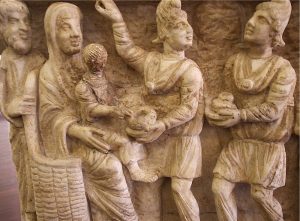Thoughts on Sunday’s Lessons for Jan. 3, 2025

Magi bear gifts to an infant Jesus in one of the earliest known depictions. 2nd Century Sarcophagus, Vatican Museums, Rome, Italy. (Click image to enlarge.)
First Reading: Jeremiah 31:7-14
Merry Christmas! Sunday is the Twelfth Day of Christmas – the Feast of the Epiphany on January 6 will relate the story of the Three Magi – and Sunday’s Lectionary readings reflect the thanksgiving, hope, and joy of Christmastide. In Sunday’s first reading, Jeremiah – who is often called “the weeping prophet” for the dire warnings of destruction that fill his prophecy – turns to shouts of praise and joy. The prophet offers hope for all of God’s people, even those weeping in sorrow and pain. God will comfort all, turn our sorrow into gladness, our mourning into joy.
Psalm: Psalm 84
In poetic themes and metaphors that resonate with the reading from Jeremiah, the Psalmist provides a hymn of trust and praise in a loving God who will protect the people and lead them home. God will provide clear water in desolate places, guard them in the heights, and serve as their shield against burning sun and raging enemy. And home at last, they will know the joy of worshiping in the restored temple, lavished with God’s grace and glory.
Second Reading: Ephesians 1:3-6, 15-19a
Paul offers generous, expansive praise for the Christian community at Ephesus in the opening pages of his letter to the church in this Greek city located on what is now Turkey’s Aegean shore. Paul praises the Ephesians for their faith in Jesus and offers them a promise similar to the one we heard in last week’s reading from Galatians: All are adopted as God’s children through Jesus, and in this way are freely given God’s grace.
The Lectionary offers a choice of three Gospels for the Second Sunday of Christmas: Matthew’s account of the Holy Family’s escape to Egypt from King Herod’s wrath; Luke’s story of the boy Jesus in the Temple; and Matthew’s narrative of the visit of the wise men from the East.
Gospel: Matthew 2:13-23
This is a difficult reading to ponder during the joy of Christmastide, and it gets worse if you look up the three verses that the Lectionary omits: The horrifying story about Herod’s genocidal slaughter of the infants in Bethlehem. This bloody event may not be historical, as no contemporary historians of the era mention it. Even without this passage, though, the story of Joseph, Mary, and Jesus fleeing to Egypt as refugees frames an important reality: When Jesus is grown, he will seek to bring in the Kingdom of God by delivering good news to the poor and the oppressed. This mission will not always be received with joy and approval, and it will lead to his crucifixion.
Gospel: Luke 2:41-52
The four gospels tell us little or nothing about Jesus’s childhood and youth. This disappointing gap is filled only by this short, fascinating story that appears only in Luke’s Gospel: Twelve-year-old Jesus disappears while the family is in Jerusalem, to the horror of Joseph and Mary, who find him three days later in the Temple, impressing the elders with his intelligent discussion. The child reassures his frantic parents, declaring that his place is in his “Father’s house,” the Temple. In the next chapter, in Luke’s account of the baptism of the 30-year-old Jesus by John the Baptist in the Jordan, we will hear the voice of God announce that Jesus is indeed God’s beloved Son.
Gospel: Matthew 2:1-12
“We Three Kings of Orient Are … “ One of the most memorable Christmas hymns tells the familiar story of wise men from the East who followed a shining star to Bethlehem, the village that the prophets foretold as the birthplace of the Messiah. It might surprise us, though, to remember that Matthew doesn’t actually say there were three of them, or that they were kings. They are called “Magi” in the original Greek, a word meaning “magicians,” “astrologers,” or, simply, “wise men.” They came, Matthew tells us, following the star. They brought gifts. They knelt and paid homage to baby Jesus as if he were a king … and then they thwarted Herod’s evil plan to murder the child by heading home by a different route.
